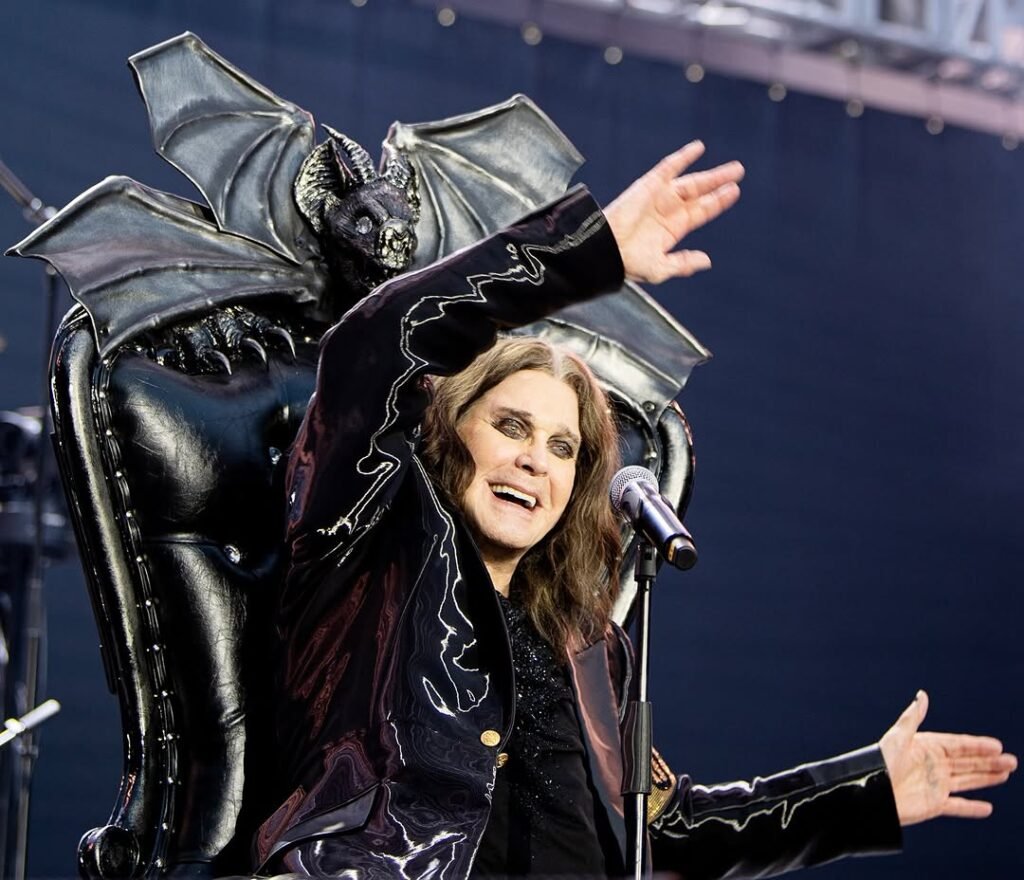Few names conjure as much awe in British music as Ozzy Osbourne. Revered as the “Prince of Darkness” and one of heavy metal’s founding fathers, Osbourne’s name has spanned generations, styles, and even continents. Now, as the UK and the wider world react to the news of his death at the age of 76, there is a sense that a seismic chapter in music history has closed. Osbourne’s journey from Aston, Birmingham, to global superstardom shaped not only a genre but also modern pop culture.
Childhood and Origins: Birmingham’s Gift to the World
Born John Michael Osbourne in December 1948, Ozzy was raised in a working-class family in Aston, Birmingham. The city’s industrial landscape was the backdrop to a youth marked by hardship, brushes with the law, and a restless creative spirit. These early experiences shaped much of his later music with Black Sabbath, channeling industrial gloom and working-class stresses into a powerful new sound.
Black Sabbath and the Birth of Heavy Metal
Osbourne found fame as the frontman of Black Sabbath, the band he formed in 1968 alongside Tony Iommi, Geezer Butler, and Bill Ward. Their debut in 1970 shocked the establishment, blending hard rock, blues, and morbid themes uncharted in popular music. Songs like “Paranoid,” “War Pigs,” and “Iron Man” became anthems, their dark riffs and dramatic lyrics reflecting both the UK’s anxieties and its rebellious creativity.
Black Sabbath forged a new musical path, widely credited with inventing the heavy metal genre. Their sound resonated with working-class youth at home and soon drew dedicated fans around the globe. Osbourne’s dramatic vocal style, wild antics, and theatrical stage presence kept the band in headlines and on heavy rotation. For UK music, Black Sabbath’s success provided a counterpoint to London’s glitz, making Birmingham a focus of serious cultural achievement.
Solo Success and Reinvention
Despite—or perhaps because of—his infamous excesses, Osbourne’s career only accelerated when he left Black Sabbath in 1979. His solo debut, Blizzard of Ozz (1980), produced the classic “Crazy Train.” The album’s success cemented his status as a global rock icon. Over the next four decades, Osbourne released more than ten solo albums, selling over 100 million records throughout his career. His dark humour, driving musicianship, and refusal to be tamed made him essential to rock’s ongoing story.
Infamy, Controversy, and the Price of Fame
Osbourne’s career was not just musical—it was mythic. He became notorious in the UK and abroad for a string of wild antics, most famously biting the head off a bat on stage in 1982, an incident that haunted rock folklore ever after. His struggles with addiction further cemented his maverick reputation, yet also earned him empathy as he repeatedly sought recovery and returned to the spotlight.
In the 2000s, a new generation discovered Osbourne through The Osbournes, MTV’s hit reality show. It offered an unfiltered look at his home life with his wife Sharon and their children, making Ozzy a beloved household figure in both the UK and America. The show’s candidness revealed a surprisingly gentle, if eccentric, family man and brought fresh humanity to the so-called Prince of Darkness.
Health Battles: Resilience Amid Decline
Osbourne’s later years were marked by serious health challenges. After suffering a severe ATV accident in 2003, he endured years of pain and multiple surgeries. In 2019, he suffered a serious fall in his Los Angeles home that dislodged previously inserted metal rods and required more operations. Around the same time, Osbourne received a diagnosis of Parkinson’s disease, a neurodegenerative condition which affected his mobility but never silenced his voice. Despite facing debilitating symptoms, including loss of movement and balance, Osbourne remained determined to keep creating music and connecting with his fans. His spirit of resilience inspired tributes and admiration from all corners of the music world.
A Final Bow in Birmingham
In July 2025, Osbourne performed his final live show at Villa Park, Birmingham, reuniting with his Black Sabbath bandmates for a farewell performance steeped in nostalgia and emotion. The event, titled “Back to the Beginning,” gathered fans from across the UK and beyond, with proceeds benefiting local charities. Performing from a throne due to his physical limitations, Osbourne gave thanks to the audience for decades of support, declaring, “You’ve no idea how I feel – thank you from the bottom of my heart”. Just weeks later, the music world mourned his passing, with family and friends at his side.
National and International Tributes
The announcement of Osbourne’s death prompted a massive outpouring of tributes. Fellow musicians, including members of Black Sabbath and Metallica, British artists, and TV personalities, all hailed Osbourne’s role in shaping music and culture. The band’s surviving members posted a simple “Ozzy Forever!” alongside a photo of their legendary frontman.
The Prime Minister and the Mayor of Birmingham praised Osbourne for putting the city on the musical map. Ordinary fans reflected on his importance, recalling their first concerts or the times Osbourne’s music helped them through life’s darker days.
Legacy: Inventor, Icon, and Inspiration
Ozzy Osbourne leaves behind an extraordinary legacy. He transformed the sound and public perception of British rock, inspiring countless musicians and bands that still dominate UK charts today. His openness about addiction, mental health, and physical decline encouraged vital discussions about celebrity and vulnerability. Osbourne’s story, rooted in Birmingham grit, became a template for surviving—and thriving—against the odds.
Conclusion
For many in the UK, Ozzy Osbourne was more than a performer. He was a symbol of reinvention, a proud son of Birmingham, and the living embodiment of rock’s rebellious soul. Through six decades, his music, mischief, and honest vulnerability forged a bond with fans that will endure well beyond his passing. The tributes flooding in today confirm that Osbourne was never just the Prince of Darkness— he was, and will remain, a national treasure.
To read more click here

